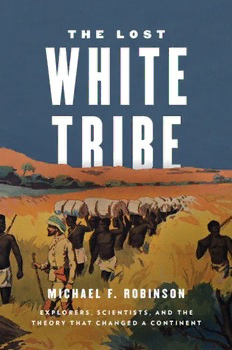
The lost white tribe: explorers, scientists, and the theory that changed a continent PDF
Preview The lost white tribe: explorers, scientists, and the theory that changed a continent
THE LOST WHITE TRIBE THE LOST WHITE TRIBE Explorers, Scientists, and the Theory that Changed a Continent Michael F. Robinson 1 1 Oxford University Press is a department of the University of Oxford. It furthers the University’s objective of excellence in research, scholarship, and education by publishing worldwide. Oxford is a registered trade mark of Oxford University Press in the UK and certain other countries. Published in the United States of America by Oxford University Press 198 Madison Avenue, New York, NY 10016, United States of America © Michael F. Robinson 2016 All rights reserved. No part of this publication may be reproduced, stored in a retrieval system, or transmitted, in any form or by any means, without the prior permission in writing of Oxford University Press, or as expressly permitted by law, by license, or under terms agreed with the appropriate reproduction rights organization. Inquiries concerning reproduction outside the scope of the above should be sent to the Rights Department, Oxford University Press, at the address above. You must not circulate this work in any other form, and you must impose this same condition on any acquirer. Library of Congress Cataloging-in-Publication Data Robinson, Michael F. (Michael Frederick), 1966– author. The lost white tribe : explorers, scientists, and the theory that changed a continent / Michael F. Robinson. pages cm Includes bibliographical references and index. ISBN 978-0-19-997848-9—ISBN 978-0-19-997849-6—ISBN 978-0-19-997850-2 1. Africa—Discovery and exploration—European. 2. Africa—Colonization—History—19th century. 3. Ethnology—Africa—History. 4. Whites—Africa—History. I. Title. DT3.R63 2016 960.23—dc23 2015015102 1 3 5 7 9 8 6 4 2 Printed in the United States of America on acid-free paper To Michele CONTENTS Acknowledgments ix Introduction 1 PART I: STANLEY’S LOST STORY 1. Gambaragara 13 2. Another World 23 3. Early Encounters 36 4. The Story Breaks 47 5. The Curse of Ham 55 6. Oriental Jones 64 7. The Beautiful Skull 75 8. The Hypothesis Revised 85 9. King Mutesa 95 10. Great Zimbabwe 108 11. At the Summit 120 Contents viii PART II: A WORLD GONE WHITE 12. The Dynastic Race 137 13. The Aryan Tidal Wave 147 14. Blond Eskimos 162 15. Tribes of the Imagination 175 16. The White Psyche 188 17. Cracks in the Theory 199 18. The Roof of the World 211 19. Colored by War 224 20. Kennewick Man 235 Epilogue: What Did Stanley See? 245 Notes 257 Select Bibliography 279 Index 289 ACKNOWLEDGMENTS This project began in 1998 when I read Vilhjalmur Stefansson’s essay about his encounter with “Blond Eskimos.” It was a strange story. At the time, it didn’t follow the direction of my research on Arctic ex- ploration, and I left it out of the book I was writing on this subject, The Coldest Crucible: Arctic Exploration and American Culture. Something about the “Blond Eskimos” story stayed with me, though, so I held on to the essay. Soon I began finding more white-encounter stories and set them aside in a file cabinet. By the time I started working on this project seriously in 2008, the cabinet was stuffed with accounts of long-lost Caucasians, Hamites, and Aryans, reviews of lost race litera- ture, Nazi expeditions, and research articles on skulls. If this project succeeds in being something more than a cabinet of strange stories, it is because I have been helped by many people. Jason Anthony, Valerie Olson, Katharine Owens, Avi Patt, Laurel Clark Shire, Bryan Sinche, Richard Troy, and Robin Troy read early proposals of The Lost White Tribe and sharpened its focus. Kathleen Sheppard, Neil Kodesh, Michele Troy, and Dane Kennedy read portions of my manu- script and offered valuable expertise. Rand Richards Cooper read this manuscript from beginning to end, and then, because he is gracious and thorough, read it again. His suggestions made it a stronger book. At the Royal Museum for Central Africa in Belgium, Dr. Mathilde Leduc-Grimaldi guided me through the collections of the Stanley Archive. At Makerere University in Kampala, professor Mahmood Mamdani, director of the Makerere Institute of Social Research, and
